"Election Day, November, 1884"
If I should need to name, O Western World, your powerfulest scene and show,
‘Twould not be you, Niagara—nor you, ye limitless prairies—nor your huge rifts of canyons, Colorado,
Nor you, Yosemite—nor Yellowstone, with all its spasmic geyser-loops ascending to the skies, appearing
and disappearing,
Nor Oregon’s white cones—nor Huron’s belt of mighty lakes—nor Mississippi’s stream:
—This seething hemisphere’s humanity, as now, I’d name—the still small voice vibrating—America’s
choosing day,
(The heart of it not in the chosen—the act itself the main, the quadriennial choosing,)
The stretch of North and South arous’d—sea-board and inland—Texas to Maine—the Prairie States—Vermont,
Virginia, California,
The final ballot-shower from East to West—the paradox and conflict,
The countless snow-flakes falling—(a swordless conflict,
Yet more than all Rome’s wars of old, or modern Napoleon’s:) the peaceful choice of all,
Or good or ill humanity—welcoming the darker odds, the dross:
—Foams and ferments the wine? it serves to purify—while the heart pants, life glows:
These stormy gusts and winds waft precious ships,
Swell’d Washington’s, Jefferson’s, Lincoln’s sails.
‘Twould not be you, Niagara—nor you, ye limitless prairies—nor your huge rifts of canyons, Colorado,
Nor you, Yosemite—nor Yellowstone, with all its spasmic geyser-loops ascending to the skies, appearing
and disappearing,
Nor Oregon’s white cones—nor Huron’s belt of mighty lakes—nor Mississippi’s stream:
—This seething hemisphere’s humanity, as now, I’d name—the still small voice vibrating—America’s
choosing day,
(The heart of it not in the chosen—the act itself the main, the quadriennial choosing,)
The stretch of North and South arous’d—sea-board and inland—Texas to Maine—the Prairie States—Vermont,
Virginia, California,
The final ballot-shower from East to West—the paradox and conflict,
The countless snow-flakes falling—(a swordless conflict,
Yet more than all Rome’s wars of old, or modern Napoleon’s:) the peaceful choice of all,
Or good or ill humanity—welcoming the darker odds, the dross:
—Foams and ferments the wine? it serves to purify—while the heart pants, life glows:
These stormy gusts and winds waft precious ships,
Swell’d Washington’s, Jefferson’s, Lincoln’s sails.
This poem is in the public domain.
I chose some lines here to be pointed out somewhere with in the book I am working on.
"The Poet" (a Story of Biblical Per proportions) I have a ways to go with it and I truly need help with it the kind that I just can't afford at this moment in Time.
Walter "Walt" Whitman (/ˈhwɪtmən/; May 31, 1819 – March 26, 1892) was an American poet, essayist and journalist. A humanist, he was a part of the transition between transcendentalism and realism, incorporating both views in his works.
Whitman is among the most influential poets in the American canon, often called the father of free verse.[1]
His work was very controversial in its time, particularly his poetry collection Leaves of Grass, which was described as obscene for its overt sexuality.
Born in Huntington on Long Island, Whitman worked as a journalist, a teacher, a government clerk, and—in addition to publishing his poetry—was a volunteer nurse during the American Civil War. Early in his career, he also produced a temperance novel, Franklin Evans (1842).
Whitman's major work, Leaves of Grass, was first published in 1855 with his own money. The work was an attempt at reaching out to the common person with an American epic. He continued expanding and revising it until his death in 1892.
After a stroke towards the end of his life, he moved to Camden, New Jersey, where his health further declined. When he died at age 72, his funeral became a public spectacle.[2][3]
Whitman's sexuality is often discussed alongside his poetry. Though biographers continue to debate his sexuality, he is usually described as either homosexual or bisexual in his feelings and attractions. However, there is disagreement among biographers as to whether Whitman had actual sexual experiences with men.[4]
Whitman was concerned with politics throughout his life. He supported the Wilmot Proviso and opposed the extension of slavery generally.
His poetry presented an egalitarian view of the races, though his attitude in life reflected many of the racial prejudices common to nineteenth-century America and his opposition to slavery was not necessarily based on belief in the equality of races per se.[5]
At one point he called for the abolition of slavery, but later he saw the abolitionist movement as a threat to democracy.[6]
| Walt Whitman | |
|---|---|
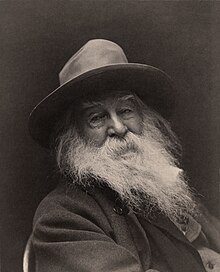
Walt Whitman, 1887
|
|
| Born | May 31, 1819 West Hills, Huntington, Long Island, New York, U.S. |
| Died | March 26, 1892 (aged 72) Camden, New Jersey, U.S. |
| Signature | |
Life and work
Early life
Walter Whitman was born on May 31, 1819, in West Hills, Town of Huntington, Long Island, to parents with interests in Quaker thought, Walter and Louisa Van Velsor Whitman. The second of nine children,[7] he was immediately nicknamed "Walt" to distinguish him from his father.[8]Walter Whitman, Sr. named three of his seven sons after American leaders: Andrew Jackson, George Washington, and Thomas Jefferson. The oldest was named Jesse and another boy died unnamed at the age of six months. The couple's sixth son, the youngest, was named Edward.[8]
At age four, Whitman moved with his family from West Hills to Brooklyn, living in a series of homes, in part due to bad investments.[9] Whitman looked back on his childhood as generally restless and unhappy, given his family's difficult economic status.[10]
One happy moment that he later recalled was when he was lifted in the air and kissed on the cheek by the Marquis de Lafayette during a celebration in Brooklyn on July 4, 1825.[11]
At age eleven Whitman concluded formal schooling.[12] He then sought employment for further income for his family; he was an office boy for two lawyers and later was an apprentice and printer's devil for the weekly Long Island newspaper the Patriot, edited by Samuel E. Clements.[13]
There, Whitman learned about the printing press and typesetting.[14] He may have written "sentimental bits" of filler material for occasional issues.[15]
Clements aroused controversy when he and two friends attempted to dig up the corpse of Elias Hicks to create a plaster mold of his head.[16] Clements left the Patriot shortly afterward, possibly as a result of the controversy.[17]
Early career
Whitman, age 28
While at the Star, Whitman became a regular patron of the local library, joined a town debating society, began attending theater performances,[19] and anonymously published some of his earliest poetry in the New York Mirror.[20]
At age 16 in May 1835, Whitman left the Star and Brooklyn.[21] He moved to New York City to work as a compositor[22] though, in later years, Whitman could not remember where.[23]
He attempted to find further work but had difficulty, in part due to a severe fire in the printing and publishing district,[23] and in part due to a general collapse in the economy leading up to the Panic of 1837.[24]
In May 1836, he rejoined his family, now living in Hempstead, Long Island.[25]
Whitman taught intermittently at various schools until the spring of 1838, though he was not satisfied as a teacher.[26]
After his teaching attempts, Whitman went back to Huntington, New York to found his own newspaper, the Long Islander. Whitman served as publisher, editor, pressman, and distributor and even provided home delivery. After ten months, he sold the publication to E. O. Crowell, whose first issue appeared on July 12, 1839.[27]
There are no known surviving copies of the Long-Islander published under Whitman.[28] By the summer of 1839, he found a job as a typesetter in Jamaica, Queens with the Long Island Democrat, edited by James J. Brenton.[27]
He left shortly thereafter, and made another attempt at teaching from the winter of 1840 to the spring of 1841.[29] One story, possibly apocryphal, tells of Whitman's being chased away from a teaching job in Southold, New York in 1840.
After a local preacher called him a "Sodomite", Whitman was allegedly tarred and feathered. Biographer Justin Kaplan notes that the story is likely untrue, because Whitman regularly vacationed in the town thereafter.[30]
Biographer Jerome Loving calls the incident a "myth".[31] During this time, Whitman published a series of ten editorials, called "Sun-Down Papers—From the Desk of a Schoolmaster", in three newspapers between the winter of 1840 and July 1841.
In these essays, he adopted a constructed persona, a technique he would employ throughout his career.[32]
Whitman moved to New York City in May, initially working a low-level job at the New World, working under Park Benjamin, Sr. and Rufus Wilmot Griswold.[33]
He continued working for short periods of time for various newspapers; in 1842 he was editor of the Aurora and from 1846 to 1848 he was editor of the Brooklyn Eagle.[34]
Brooklyn Daily Eagle, c. 1915
Whitman was a delegate to the 1848 founding convention of the Free Soil Party.
Leaves of Grass
Main article: Leaves of Grass
He first experimented with a variety of popular literary genres which appealed to the cultural tastes of the period.[38] As early as 1850, he began writing what would become Leaves of Grass,[39] a collection of poetry which he would continue editing and revising until his death.[40]
Whitman intended to write a distinctly American epic[41] and used free verse with a cadence based on the Bible.[42]
At the end of June 1855, Whitman surprised his brothers with the already-printed first edition of Leaves of Grass. George "didn't think it worth reading".[43]
Walt Whitman, age 35, from the frontispiece to Leaves of Grass, Fulton St., Brooklyn, N.Y., steel engraving by Samuel Hollyer from a lost daguerreotype by Gabriel Harrison.
No name is given as author; instead, facing the title page was an engraved portrait done by Samuel Hollyer,[46] but 500 lines into the body of the text he calls himself "Walt Whitman, an American, one of the roughs, a kosmos, disorderly, fleshly, and sensual, no sentimentalist, no stander above men or women or apart from them, no more modest than immodest".[47]
The inaugural volume of poetry was preceded by a prose preface of 827 lines. The succeeding untitled twelve poems totaled 2315 lines—1336 lines belonging to the first untitled poem, later called "Song of Myself".
The book received its strongest praise from Ralph Waldo Emerson, who wrote a flattering five-page letter to Whitman and spoke highly of the book to friends.[48]
The first edition of Leaves of Grass was widely distributed and stirred up significant interest,[49] in part due to Emerson's approval,[50] but was occasionally criticized for the seemingly "obscene" nature of the poetry.[51]
Geologist John Peter Lesley wrote to Emerson, calling the book "trashy, profane & obscene" and the author "a pretentious ass".[52] On July 11, 1855, a few days after Leaves of Grass was published, Whitman's father died at the age of 65.[53]
In the months following the first edition of Leaves of Grass, critical responses began focusing more on the potentially offensive sexual themes. Though the second edition was already printed and bound, the publisher almost did not release it.[54]
In the end, the edition went to retail, with 20 additional poems,[55] in August 1856.[56] Leaves of Grass was revised and re-released in 1860[57] again in 1867, and several more times throughout the remainder of Whitman's life.
Several well-known writers admired the work enough to visit Whitman, including Bronson Alcott and Henry David Thoreau.[58]
During the first publications of Leaves of Grass, Whitman had financial difficulties and was forced to work as a journalist again, specifically with Brooklyn's Daily Times starting in May 1857.[59]
As an editor, he oversaw the paper's contents, contributed book reviews, and wrote editorials.[60] He left the job in 1859, though it is unclear if he was fired or chose to leave.[61]
Whitman, who typically kept detailed notebooks and journals, left very little information about himself in the late 1850s.[62]
Civil War years
Walt Whitman's handwritten manuscript for "Broadway, 1861".
Whitman's brother George had joined the Union army and began sending Whitman several vividly detailed letters of the battle front.[64]
On December 16, 1862, a listing of fallen and wounded soldiers in the New York Tribune included "First Lieutenant G. W. Whitmore", which Whitman worried was a reference to his brother George.[65]
He made his way south immediately to find him, though his wallet was stolen on the way.[66]
"Walking all day and night, unable to ride, trying to get information, trying to get access to big people", Whitman later wrote,[67] he eventually found George alive, with only a superficial wound on his cheek.[65]
Whitman, profoundly affected by seeing the wounded soldiers and the heaps of their amputated limbs, left for Washington on December 28, 1862 with the intention of never returning to New York.[66]
In Washington, D.C., Whitman's friend Charley Eldridge helped him obtain part-time work in the army paymaster's office, leaving time for Whitman to volunteer as a nurse in the army hospitals.[68]
He would write of this experience in "The Great Army of the Sick", published in a New York newspaper in 1863[69] and, 12 years later, in a book called Memoranda During the War.[70]
He then contacted Emerson, this time to ask for help in obtaining a government post.[66] Another friend, John Trowbridge, passed on a letter of recommendation from Emerson to Salmon P. Chase, Secretary of the Treasury, hoping he would grant Whitman a position in that department.
Chase, however, did not want to hire the author of such a disreputable book as Leaves of Grass.[71]
The Whitman family had a difficult end to 1864. On September 30, 1864, Whitman's brother George was captured by Confederates in Virginia,[72] and another brother, Andrew Jackson, died of tuberculosis compounded by alcoholism on December 3.[73]
That month, Whitman committed his brother Jesse to the Kings County Lunatic Asylum.[74]
Whitman's spirits were raised, however, when he finally got a better-paying government post as a low-grade clerk in the Bureau of Indian Affairs in the Department of the Interior, thanks to his friend William Douglas O'Connor.
O'Connor, a poet, daguerreotypist and an editor at the Saturday Evening Post, had written to William Tod Otto, Assistant Secretary of the Interior, on Whitman's behalf.[75] Whitman began the new appointment on January 24, 1865, with a yearly salary of $1,200.[76]
A month later, on February 24, 1865, George was released from capture and granted a furlough because of his poor health.[75] By May 1, Whitman received a promotion to a slightly higher clerkship[76] and published Drum-Taps.[77]
Effective June 30, 1865, however, Whitman was fired from his job.[77] His dismissal came from the new Secretary of the Interior, former Iowa Senator James Harlan.[76]
Though Harlan dismissed several clerks who "were seldom at their respective desks", he may have fired Whitman on moral grounds after finding an 1860 edition of Leaves of Grass.[78] O'Connor protested until J. Hubley Ashton had Whitman transferred to the Attorney General's office on July 1.[79]
O'Connor, though, was still upset and vindicated Whitman by publishing a biased and exaggerated biographical study, The Good Gray Poet, in January 1866. The fifty-cent pamphlet defended Whitman as a wholesome patriot, established the poet's nickname and increased his popularity.[80]
Also aiding in his popularity was the publication of "O Captain! My Captain!", a relatively conventional poem on the death of Abraham Lincoln, the only poem to appear in anthologies during Whitman's lifetime.[81]
Part of Whitman's role at the Attorney General's office was interviewing former Confederate soldiers for Presidential pardons. "There are real characters among them", he later wrote, "and you know I have a fancy for anything out of the ordinary."[82]
In August 1866, he took a month off in order to prepare a new edition of Leaves of Grass which would not be published until 1867 after difficulty in finding a publisher.[83] He hoped it would be its last edition.[84]
In February 1868, Poems of Walt Whitman was published in England thanks to the influence of William Michael Rossetti,[85] with minor changes that Whitman reluctantly approved.[86] The edition became popular in England, especially with endorsements from the highly respected writer Anne Gilchrist.[87]
Another edition of Leaves of Grass was issued in 1871, the same year it was mistakenly reported that its author died in a railroad accident.[88]
As Whitman's international fame increased, he remained at the attorney general's office until January 1872.[89] He spent much of 1872 caring for his mother who was now nearly eighty and struggling with arthritis.[90]
He also traveled and was invited to Dartmouth College to give the commencement address on June 26, 1872.[91]
Health decline and death
Walt Whitman spent his last years at his home in Camden, New Jersey. Today, it is open to the public as the Walt Whitman House.
His mother, having fallen ill, was also there and died that same year in May. Both events were difficult for Whitman and left him depressed. He remained at his brother's home until buying his own in 1884.[92]
However, before purchasing his home, he spent the greatest period of his residence in Camden at his brother's home in Stevens Street. While in residence there he was very productive, publishing three versions of Leaves of Grass among other works.
He was also last fully physically active in this house, receiving both Oscar Wilde and Thomas Eakins. His other brother, Edward, an "invalid" since birth, lived in the house.
When his brother and sister-in-law were forced to move for business reasons, he bought his own house at 328 Mickle Street (now 330 Dr. Martin Luther King Jr. Boulevard).[93]
First taken care of by tenants, he was completely bedridden for most of his time in Mickle Street. During this time, he began socializing with Mary Oakes Davis—the widow of a sea captain. She was a neighbor, boarding with a family in Bridge Avenue just a few blocks from Mickle Street.[94]
She moved in with Whitman on February 24, 1885, to serve as his housekeeper in exchange for free rent. She brought with her a cat, a dog, two turtledoves, a canary, and other assorted animals.[95]
During this time, Whitman produced further editions of Leaves of Grass in 1876, 1881, and 1889.
While in Southern New Jersey Whitman spent a good portion of his time in the then quite pastoral community of Laurel Springs between 1876 and 1884, converting one of the Stafford Farm buildings to his summer home.
The restored summer home has been preserved as museum by the local historical society. Part of his Leaves of Grass was written here, and in his Specimen Days he wrote of the spring, creek and lake. To him, Laurel Lake was "the prettiest lake in: either America or Europe."[96]
As the end of 1891 approached, he prepared a final edition of Leaves of Grass, a version that has been nicknamed the "Deathbed Edition." He wrote, "L. of G. at last complete—after 33 y'rs of hackling at it, all times & moods of my life, fair weather & foul, all parts of the land, and peace & war, young & old."[97]
Preparing for death, Whitman commissioned a granite mausoleum shaped like a house for $4,000[98] and visited it often during construction.[99]
In the last week of his life, he was too weak to lift a knife or fork and wrote: "I suffer all the time: I have no relief, no escape: it is monotony—monotony—monotony—in pain."[100]
 |
An 1890 recording thought to be Walt Whitman reading the opening four lines of his poem "America".
|
| Problems playing this file? See media help. | |
Whitman died on March 26, 1892.[101]
An autopsy revealed his lungs had diminished to one-eighth their normal breathing capacity, a result of bronchial pneumonia,[98] and that an egg-sized abscess on his chest had eroded one of his ribs.
The cause of death was officially listed as "pleurisy of the left side, consumption of the right lung, general miliary tuberculosis and parenchymatous nephritis."[102]
A public viewing of his body was held at his Camden home; over one thousand people visited in three hours.[2]
Whitman's oak coffin was barely visible because of all the flowers and wreaths left for him.[102]
Four days after his death, he was buried in his tomb at Harleigh Cemetery in Camden .[2] Another public ceremony was held at the cemetery, with friends giving speeches, live music, and refreshments.[3]
Whitman's friend, the orator Robert Ingersoll, delivered the eulogy.[103]
Later, the remains of Whitman's parents and two of his brothers and their families were moved to the mausoleum.[104]
Writing
He also used unusual images and symbols in his poetry, including rotting leaves, tufts of straw, and debris.[105]
He also openly wrote about death and sexuality, including prostitution.[84]
He is often labeled as the father of free verse, though he did not invent it.[1]
Poetic theory
Whitman wrote in the preface to the 1855 edition of Leaves of Grass, "The proof of a poet is that his country absorbs him as affectionately as he has absorbed it." He believed there was a vital, symbiotic relationship between the poet and society.[106]This connection was emphasized especially in "Song of Myself" by using an all-powerful first-person narration.[107]
As an American epic, it deviated from the historic use of an elevated hero and instead assumed the identity of the common people.[108]
Leaves of Grass also responded to the impact that recent urbanization in the United States had on the masses.[109]
Lifestyle and beliefs
Walt Whitman
Alcohol
Whitman was a vocal proponent of temperance and in his youth rarely drank alcohol. He once stated he did not taste "strong liquor" until he was thirty[110] and occasionally argued for prohibition.[111]One of his earliest long fiction works, the novel Franklin Evans; or, The Inebriate, first published November 23, 1842, is a temperance novel.[112]
Whitman wrote the novel at the height of popularity of the Washingtonian movement though the movement itself was plagued with contradictions, as was Franklin Evans.[113]
Years later Whitman claimed he was embarrassed by the book[114] and called it a "damned rot".[115] He dismissed it by saying he wrote the novel in three days solely for money while he was under the influence of alcohol himself.[116]
Even so, he wrote other pieces recommending temperance, including The Madman and a short story "Reuben's Last Wish".[117]
Later in life he was more liberal with alcohol, enjoying local wines and champagne.[118]
Religion
Whitman was deeply influenced by deism.He denied any one faith was more important than another, and embraced all religions equally.[119]
In "Song of Myself", he gave an inventory of major religions and indicated he respected and accepted all of them—a sentiment he further emphasized in his poem "With Antecedents", affirming: "I adopt each theory, myth, god, and demi-god, / I see that the old accounts, bibles, genealogies, are true, without exception".[119]
In 1874, he was invited to write a poem about the Spiritualism movement, to which he responded, "It seems to me nearly altogether a poor, cheap, crude humbug."[120]
Whitman was a religious skeptic: though he accepted all churches, he believed in none.[119] God, to Whitman, was both immanent and transcendent and the human soul was immortal and in a state of progressive development.[121]
American Philosophy: An Encyclopedia classes him as one of several figures who "took a more pantheist or pandeist approach by rejecting views of God as separate from the world."[122]
Sexuality
Whitman and Peter Doyle, one of the men with whom Whitman was believed to have had an intimate relationship
His poetry depicts love and sexuality in a more earthy, individualistic way common in American culture before the medicalization of sexuality in the late 19th century.[123]
Though Leaves of Grass was often labeled pornographic or obscene, only one critic remarked on its author's presumed sexual activity: in a November 1855 review, Rufus Wilmot Griswold suggested Whitman was guilty of "that horrible sin not to be mentioned among Christians".[124]
Whitman had intense friendships with many men and boys throughout his life.
Some biographers have suggested that he may not have actually engaged in sexual relationships with males,[4] while others cite letters, journal entries, and other sources that they claim as proof of the sexual nature of some of his relationships.[125]
Whitman himself, in a response to a letter from English poet and critic John Addington Symonds asking, "In your conception of Comradeship, do you contemplate the possible intrusion of those semi-sexual emotions and actions which no doubt do occur between men?" replied vigorously denying that his work had any such implication, asserting "[T]hat the calamus part has even allow’d the possibility of such construction as mention’d is terrible—I am fain to hope the pages themselves are not to be even mention’d for such gratuitous and quite at this time entirely undream’d & unreck’d possibility of morbid inferences—wh’ are disavow’d by me and seem damnable," and insisting that he had fathered six illegitimate children.
Some contemporary scholars are skeptical of the veracity of Whitman's denial or the existence of the children he claimed.[126]
Allen Ginsberg received from Gavin Arthur a document, several times reprinted, in which Arthur described his meeting with early gay activist Edward Carpenter, who told Arthur of his lovemaking with Whitman.[127]
Peter Doyle may be the most likely candidate for the love of Whitman's life.[128] [129][130]
Doyle was a bus conductor whom Whitman met around 1866, and the two were inseparable for several years.
Interviewed in 1895, Doyle said: "We were familiar at once—I put my hand on his knee—we understood. He did not get out at the end of the trip—in fact went all the way back with me."[131]
In his notebooks, Whitman disguised Doyle's initials using the code "16.4" (P.D. being the 16th and 4th letters of the alphabet).[132]
A more direct, secondhand account comes from Oscar Wilde: Wilde met Whitman in America in 1882 and wrote to the homosexual-rights activist George Cecil Ives that there was "no doubt" about the great American poet's sexual orientation—"I have the kiss of Walt Whitman still on my lips", he boasted.[133]
The only explicit description of Whitman's sexual activities is secondhand. In 1924, Edward Carpenter, then an old man, described to Gavin Arthur an erotic encounter that Carpenter had had in his youth with Whitman; Arthur recorded it in detail in his journal.[134][135]
Late in his life, when Whitman was asked outright whether his "Calamus" poems were homosexual, he chose not to respond.[136]
Duckett was fifteen when Whitman bought his house at 328 Mickle Street.
From at least 1880, Duckett and his grandmother, Lydia Watson, were boarders, subletting space from another family at 334 Mickle Street. Because of this proximity, it is obvious that Duckett and Whitman met as neighbors.
Their relationship was close, with the youth sharing Whitman's money when he had it. Whitman described their friendship as "thick". Though some biographers describe him as a boarder, others identify him as a lover.[137]
Their photograph [pictured] is described as "modeled on the conventions of a marriage portrait", part of a series of portraits of the poet with his young male friends, and encrypting male–male desire.[138]
Yet another intense relationship of Whitman with a young man was the one with Harry Stafford, with whose family Whitman stayed when at Timber Creek, and whom he first met when Stafford was 18, in 1876.
Whitman gave Stafford a ring, which was returned and re-given over the course of a stormy relationship lasting several years. Of that ring, Stafford wrote to Whitman, "You know when you put it on there was but one thing to part it from me, and that was death."[139]
There is also some evidence that Whitman may have had sexual relationships with women. He had a romantic friendship with a New York actress, Ellen Grey, in the spring of 1862, but it is not known if it was also sexual.
He still had a photograph of her decades later, when he moved to Camden, and he called her "an old sweetheart of mine".[140]
In a letter, dated August 21, 1890, he claimed, "I have had six children—two are dead". This claim has never been corroborated.[141]
Toward the end of his life, he often told stories of previous girlfriends and sweethearts and denied an allegation from the New York Herald that he had "never had a love affair".[142]
As Whitman biographer Jerome Loving wrote, "the discussion of Whitman's sexual orientation will probably continue in spite of whatever evidence emerges."[4]
Shakespeare authorship
Whitman was an adherent of the Shakespeare authorship question, refusing to believe in the historic attribution of the works to William Shakespeare of Stratford-upon-Avon. Whitman comments in his November Boughs (1888) regarding Shakespeare's historical plays:Conceiv'd out of the fullest heat and pulse of European feudalism—personifying in unparalleled ways the medieval aristocracy, its towering spirit of ruthless and gigantic caste, with its own peculiar air and arrogance (no mere imitation)—only one of the "wolfish earls" so plenteous in the plays themselves, or some born descendant and knower, might seem to be the true author of those amazing works—works in some respects greater than anything else in recorded literature.[143]
Slavery
Whitman opposed the extension of slavery in the United States and supported the Wilmot Proviso.[144]At first he was opposed to abolitionism, believing the movement did more harm than good. In 1846, he wrote that the abolitionists had, in fact, slowed the advancement of their cause by their "ultraism and officiousness".[145]
His main concern was that their methods disrupted the democratic process, as did the refusal of the Southern states to put the interests of the nation as a whole above their own.[144]
In 1856, in his unpublished The Eighteenth Presidency, addressing the men of the South, he wrote "you are either to abolish slavery or it will abolish you".
Whitman also subscribed to the widespread opinion that even free African-Americans should not vote[146] and was concerned at the increasing number of African-Americans in the legislature.[147]
Legacy and influence
A British friend of Walt Whitman, Mary Smith Whitall Costelloe, wrote: "You cannot really understand America without Walt Whitman, without Leaves of Grass... He has expressed that civilization, 'up to date,' as he would say, and no student of the philosophy of history can do without him."[148] Modernist poet Ezra Pound called Whitman "America's poet... He is America."[149] Andrew Carnegie called him "the great poet of America so far".[150]
Whitman considered himself a messiah-like figure in poetry.[151]
Others agreed: one of his admirers, William Sloane Kennedy, speculated that "people will be celebrating the birth of Walt Whitman as they are now the birth of Christ".[152]
The literary critic, Harold Bloom wrote, as the introduction for the 150th anniversary of Leaves of Grass:
If you are American, then Walt Whitman is your imaginative father and mother, even if, like myself, you have never composed a line of verse. You can nominate a fair number of literary works as candidates for the secular Scripture of the United States. They might include Melville's Moby-Dick, Twain's Adventures of Huckleberry Finn, and Emerson's two series of Essays and The Conduct of Life. None of those, not even Emerson's, are as central as the first edition of Leaves of Grass.[153]
Whitman's vagabond lifestyle was adopted by the Beat movement and its leaders such as Allen Ginsberg and Jack Kerouac in the 1950s and 1960s as well as anti-war poets like Adrienne Rich and Gary Snyder.[154]
Lawrence Ferlinghetti numbered himself among Whitman's "wild children", and the title of his 1961 collection Starting from San Francisco is a deliberate reference to Whitman's Starting from Paumanok.[155]
Whitman also influenced Bram Stoker, author of Dracula, and was the model for the character of Dracula. Stoker said in his notes that Dracula represented the quintessential male which, to Stoker, was Whitman, with whom he corresponded until Whitman's death.[156]
Other admirers included the Eagle Street College, an informal group established in 1885 at the home of James William Wallace in Eagle Street, Bolton, to read and discuss the poetry of Whitman. The group subsequently became known as the Bolton Whitman Fellowship or Whitmanites. Its members held an annual 'Whitman Day' celebration around the poet's birthday.[157]
Whitman's poetry has been set to music by a large number of composers; indeed it has been suggested his poetry has been set to music more than any other American poet except for Emily Dickinson and Henry Wadsworth Longfellow.[158]
Those who have set his poems to music have included John Adams, Leonard Bernstein, Benjamin Britten, Rhoda Coghill, Ronald Corp, George Crumb, Frederick Delius, Howard Hanson, Karl Amadeus Hartmann, Hans Werner Henze, Paul Hindemith, Ned Rorem, Ralph Vaughan Williams, Kurt Weill, and Roger Sessions. "Crossing," an opera composed by Matthew Aucoin and inspired by Whitman's Civil War diaries, premiered in 2015.[159]
On May 16, 1957, the Walt Whitman Bridge, which crosses the Delaware River near his home in Camden, was opened.
In 1997, the Walt Whitman Community School opened, becoming the first private high school catering to LGBT youth.[160]
In 2009, Whitman was inducted into the New Jersey Hall of Fame.[161]
In 2013, Whitman was inducted into the Legacy Walk, an outdoor public display that celebrates LGBT history and people.[162]
Source: Wikipedia.org
TTFN
CYA Later Taters!
Thanks for Stopping by.
Donnie/ Sinbad the Sailor Man

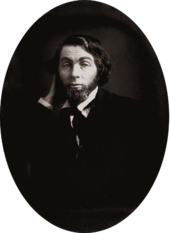


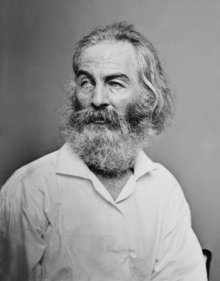
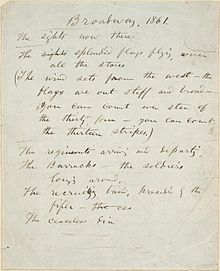
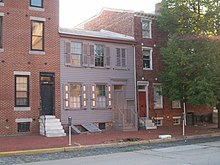

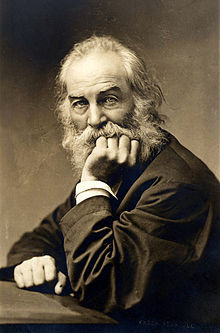


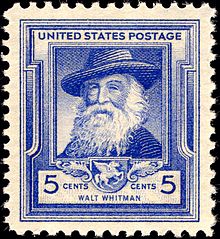
No comments:
Post a Comment